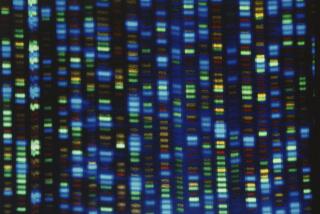Lifestyle, Diet Affect Genetic Destiny
- Share via
Ever since my father was diagnosed with prostate cancer a few years ago, I’ve had this nagging fear that I’m doomed to confront the disease too. Perhaps I’m like a lot of men in that regard. We’re more fatalistic than women when it comes to our health and well-being.
That is, I think a guy is more likely to take the “chip off the old block” thing a little too seriously, and see his father’s fate as a blueprint of his own.
How many times has a male friend doubled over in pain and complained, “I’ve got my father’s back”? New York Yankee legend Mickey Mantle was reportedly haunted by the belief that he would die by 40, like his father. And on television’s “The Sopranos,” gangster Tony Soprano is convinced that his teenage son’s panic attacks are inevitable, the product of bad genes, which Tony says he inherited from his thug of a father and passed down.
But if you spend time with your dad this Father’s Day, don’t get too caught up in worrying whether his DNA is gonna get you one of these days. Such fears are misguided, says medical geneticist Aubrey Milunsky, author of “Your Genetic
Destiny: Know Your Genes, Secure Your Health, Save Your Life” (Perseus, 2001).
“You are not doomed by the genes you carry,” said Milunsky, of Boston University’s School of Medicine. “There’s a feeling among men, in particular, of ‘there’s not much I can do with what I have,’ ” he says. But though our genes influence every aspect of our health, Milunsky notes, there is plenty a guy can do to offset the threat of an unwelcome inheritance.
He can start by learning a bit about Genetics 101. After all, the guy who is only concerned about his father’s health woes is missing half of the picture. People inherit genetic material from both parents, so they must look at both their mother and father. For example, a man can inherit gene mutations from either parent that may increase his risk of certain cancers, including prostate and colon cancers.
But cancer that’s linked directly to an inherited gene is the exception, not the rule. For instance, Milunsky says, at least 90% of the men diagnosed with prostate cancer do not carry the specific gene mutation that’s associated with the disease. Instead, their overall genetic makeup made them susceptible to the damaging effects of some external influence, which in the case of prostate cancer could be obesity, red meat, a high-fat diet or exposure to certain toxins, he says.
So your destiny is determined by the body you inherited from your parents and how you live. If you’ve ever blamed your beer belly on your father’s flabby midsection, it’s time to start accepting responsibility for your wayward waistline. “The only way to develop a beer belly is by stuffing calories into your body,” says Milunsky. “Genes build the closet, but it’s up to the man how he fills it.”
It’s also a good idea to examine all the branches of your family tree. According to Milunsky, many men are clueless about family health history. “I’ve been speaking with couples in my practice for decades,” he says, “and inevitably the man will turn to his wife and ask her a question about his uncle.”
You might be able to answer the question about your uncle yourself if you create a written family history, which should contain as much information as you can gather about the health of all your close relatives. Include aunts, uncles and cousins, and go back at least as far as your grandparents. Get as much specific information as possible. Death certificates are often incomplete or misleading; you may need to contact attending physicians or obtain autopsy reports, if available.
A complete family history is a treasure trove of information for your physician. If you or your doc suspect there’s potential trouble in your bloodline, you should schedule a sit-down with a certified medical geneticist. To find a genetic counselor, try contacting any major university medical center or check the American Board of Medical Genetics’ Web site at https://www.abmg.org. (Click on “Verifications,” then on the “Search Membership Directory” feature.)
Working with your physician, a geneticist can help devise a course of action that could counteract the influence of renegade genes. If your family has a history of heart disease, for example, you may be advised to eat a low-fat diet and take drugs to control your cholesterol levels. In other instances, genetic testing for specific diseases may be recommended.
Of course, if your family has a track record of some heritable disease, you may want no part of genetic testing for fear that your insurance company will use the information to deny coverage. Or simply for fear of learning what the future might hold for you. But Milunsky points out that many states, including California, have enacted legislation prohibiting insurers from discriminating against people who have undergone genetic testing.
And, as scary as the idea of being tested might sound, if you do carry an increased risk of developing a serious medical condition, Milunsky believes that it’s better to know--and be prepared. Otherwise, he says, “fear is replaced by chaos when people suddenly find themselves very ill.”
*
Timothy Gower can be reached at tgower@mediaone.net. The Healthy Man runs the second Monday of the month.


